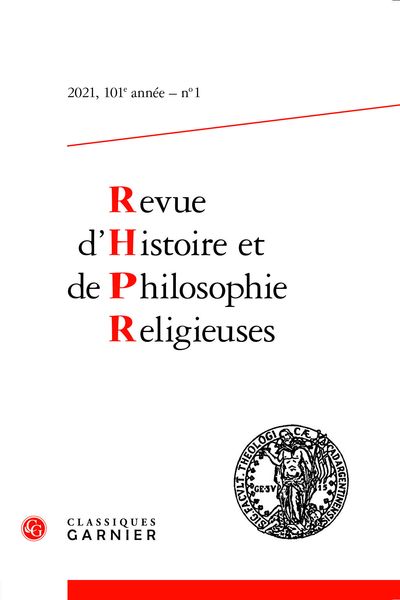
Abstracts
- Publication type: Journal article
- Journal: Revue d’histoire et de philosophie religieuses
2021 – 1, 101e année, n° 1. varia - Pages: 131 to 133
- Journal: Journal of Religious History and Philosophy
- CLIL theme: 4046 -- RELIGION -- Christianisme -- Théologie
- EAN: 9782406115021
- ISBN: 978-2-406-11502-1
- ISSN: 2269-479X
- DOI: 10.15122/isbn.978-2-406-11502-1.p.0131
- Publisher: Classiques Garnier
- Online publication: 03-15-2021
- Periodicity: Quarterly
- Language: French
Résumés/Abstracts
Annie Noblesse-Rocher, « Andreas Osiander et les Juifs. Les années 1522-1540 »
Andreas Osiander est considéré par l’historiographie comme l’un des rares Réformateurs favorables aux communautés juives. Les travaux récents d’Anselm Schubert semblent nuancer cela. Qu’en est-il vraiment ? L’examen des écrits d’Andreas Osiander concernant le judaïsme permet de constater sa fascination pour la culture juive et son expertise en ce domaine, mais révèle aussi l’ambivalence de sa relation au judaïsme quand il s’agit d’entrer dans l’action et de favoriser la Réforme à Nuremberg.
Mots-clés : Andreas Osiander, Nuremberg, Judaïsme, Réforme, Humanisme, hébraïsants, araméïsants, polémique anti-juive.
Annie Noblesse-Rocher, “Andreas Osiander and the Jews. The Years 1522-1540”
Andreas Osiander is considered by the historiography to be one of the few Reformers who were sympathetic to Jewish communities. Recent work by Anselm Schubert seems to qualify this. What is the real situation? An examination of Andreas Osiander’s writings on Judaism reveals his fascination with and expertise in Jewish culture, but also reveals the ambivalence of his relationship to Judaism when it came to taking action and promoting the Reformation in Nuremberg.
Keywords: Andreas Osiander, Nuremberg, Judaism, Reformation, humanism, Hebraist, Aramaist, anti-Jewish polemic.
Matthias Morgenstern, « Andreas Osiander était-il vraiment un ami des Juifs ? »
Andreas Osiander, auteur d’un essai visant la défense les Juifs, continua d’employer des motifs anti-juifs et refusa aux Juifs une position égale dans la société. Son attitude amicale envers les Juifs doit-elle être remise en question ? La comparaison de ses textes avec les propos anti-juifs de Luther montre qu’il emploie des motifs apparemment anti-juifs pour 132disculper les Juifs. Les jugements anachroniques mis de côté, Osiander, dans le contexte du xvie siècle, s’avère bien un ami des Juifs.
Mots-clés : Andreas Osiander, Martin Luther, antijudaïsme, accusation de meurtre rituel, Élie Lévita, Philippe Melanchthon, Jean Eck, Veit Dietrich, Anselm Schubert, Joy Kammerling.
Matthias Morgenstern, “Was Andreas Osiander Really a Friend of the Jews?”
Andreas Osiander, author of an essay in defence of the Jews, continued to use anti-Jewish motives and denied Jews an equal position in society. Should his friendly attitude towards Jews be questioned? A comparison of his texts with Luther’s anti-Jewish statements shows that he used apparently anti-Jewish motives to exonerate Jews. Setting aside anachronistic judgements, Osiander, in the context of the sixteenth century, proves to be a friend of the Jews.
Keywords: Andreas Osiander, Martin Luther, anti-Judaism, accusation of ritual murder, Elia Levita, Philip Melanchthon, John Eck, Veit Dietrich, Anselm Schubert, Joy Kammerling.
Hubert Guicharrousse, « Luther et le Liber vagatorum »
Le Liber vagatorum, ouvrage populaire rhénan imprimé en 1510, met en garde contre la mendicité abusive. Il propose une typologie des mendiants et un glossaire de l’argot des truands, le Rotwelsch, comprenant de nombreux mots hébreux. Quels motifs conduisirent Luther à rééditer cet ouvrage en 1528 ? Au-delà d’une mise en garde contre les agissements du diable, la republication du Liber vagatorum doit être replacée dans le contexte des relations de Luther avec les Juifs et le judaïsme contemporain.
Mots-clés : Luther, Réforme protestante, littérature populaire, mendiants, Rotwelsch, hébreu, Juifs, Juifs convertis au christianisme, antijudaïsme, diable.
Hubert Guicharrousse, “Luther and the Liber Vagatorum”
The Liber vagatorum, a popular Rhineland work printed in 1510, warns against abusive begging. It proposes a typology of beggars and a glossary of mendicant slang, the Rotwelsch, including many Hebrew words. What reasons led Luther to republish this work in 1528? Beyond a warning against the devil’s actions, the republication of the Liber vagatorum must be seen in the context of Luther’s relations with the Jews and contemporary Judaism.
Keywords: Luther, Protestant Reformation, popular literature, beggars, Rotwelsch, Hebrew, Jews, Jews converted to Christianity, anti-Judaism, devil.
133Édouard Mehl, « La “philosophie religieuse” de Jean Héring »
L’ouverture des archives de Jean Héring (Strasbourg) permet de jeter un regard neuf sur celui qui fut le premier disciple français de Husserl, et accessoirement un contributeur actif de la RHPR durant plus de quarante ans. L’article s’attache à rappeler l’importance qu’a eue pour lui la fréquentation des philosophes du premier cercle de Husserl (Koyré, Ingarden, Reinach), et d’expliquer ce que, comme phénoménologue, Héring entend par le terme de « philosophie religieuse ».
Mots-clés : phénoménologie, théologie protestante, idéalisme, religion, Strasbourg, Edmond Husserl, Jean Héring, Roman Ingarden, Alexandre Koyré, Adolf Reinach.
Édouard Mehl, “The ‘Religious Philosophy’ of Jean Héring”
The opening of the archives of Jean Héring (Strasbourg) allows us to take a fresh look at the man who was Husserl’s first French disciple and, incidentally, an active contributor to the RHPR for more than forty years. This article aims to recall the importance for him of his association with the philosophers of Husserl’s first circle (Koyre, Ingarden, Reinach), and to explain what, as a phenomenologist, Héring means by the term “religious philosophy”.
Keywords: Phenomenology, Protestant theology, idealism, religion, Strasbourg, Edmund Husserl, Jean Héring, Roman Ingarden, Alexandre Koyre, Adolf Reinach.